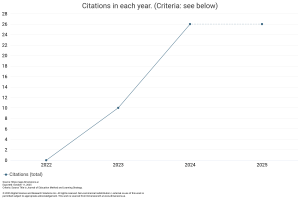Analysis and Implementation of the Effectiveness of Independent Curriculum at the Kupompong Child Growth and Development Clinic Inclusive Education Institution in Surabaya
DOI:
https://doi.org/10.59653/jemls.v2i03.1001Keywords:
Independent Curriculum, Adaptive Teaching Methods, Individualized Learning Plans, Social Skills Development, Psychological SupportAbstract
The study aims to evaluate the effectiveness of the Independent Inclusion Curriculum in enhancing learning outcomes for students with learning difficulties, such as slow learners, and those with emotional, behavioral, and intellectual barriers, as well as ADHD. It also examines differences in curriculum implementation across various educational institutions, including therapy centers for children with special needs. This qualitative phenomenological study involved observations, interviews, and documentation at the Kupompong Surabaya Child Growth and Development Clinic. Researchers collected data from seven participants, including five psychologists and two class facilitators, who supported children aged 16-18 using the inclusive Independent Curriculum. Utilizing Nvivo software for data analysis facilitated efficient management and interpretation of qualitative data. The study found that the Independent Curriculum significantly enhanced engagement and learning outcomes for students with various disabilities. Key improvements included better social skills, increased participation in classroom activities, and higher academic achievement. The curriculum's flexible and individualized approach, incorporating adaptive teaching methods and therapeutic interventions, effectively addressed each student's unique needs. The Independent Curriculum's inclusive design successfully supports students with diverse learning difficulties by providing personalized learning plans and employing adaptive teaching methods. This research aligns with the global trend in inclusive education by promoting tolerance, respect for diversity, and integration of students with special needs into mainstream education settings. This approach benefits students with disabilities and enriches the learning experience for all students by fostering a more diverse and inclusive environment.
Downloads
References
Arriani, F., Agustiawati, Rizki, A., Ranti, W., Wibowo, S., Tulalessy, C., & Herawati, F. (2021). Panduan Pelaksanaan Pendidikan Inklusif. Kementerian Pendidikan, Kebudayaan, Riset Dan Teknologi, 74.
Balasundaram, & Avulakunta. (2023). Human Growth and Development. StatPearls. https://www.ncbi.nlm.nih.gov/books/NBK567767/
Creswell, J. W. (2019). Research Design: Qualitative, Quantitative, and Mixed Method Approaches. Sage Publications. https://www.scirp.org/reference/referencespapers?referenceid=3133716
Gantini, D., Mardiah, S. S., Patimah, S., Rismawan, W., Iii, D., Program, S., Tasikmalaya, P. K., Tunas, B., & Java, W. (2022). Development of E Rapport on Child Growth and Development in the Early Chilhood Education ( PAUD ) Bachelor of Applied Midwifery Study Program , Poltekkes Kemenkes Tasikmalaya , West Java , Corresponding Email : * wawanrismawan@universitas-bth.ac.id. 0–1.
Handayani, N. D., & Mantra, I. B. N. (2023). Independence Curriculum in Practice: Examing Learning Models Deployed by School Teachers. International Journal of Applied Science and Sustainable Development, 5(2), 38–44.
Haryanti, P., Panduragan, S. letchmi, & Aljaberi, M. A. (2024). International Journal of Health Sciences ( IJHS ) International Journal of Health Sciences ( IJHS ). International Journal of Health Sciences (IJHS), 2(1), 325–337. https://jurnal.agdosi.com/index.php/IJHS/article/view/301
Indriastuti, Y., Sufa, S. A., Desember, I. G. K. H., & Rizky, Y. D. (2020). THE ROLE OF FAMILY COMMUNICATIONS TOWARD CHILDREN BEHAVIOR (STUDY ABOUT TRANSGENDER BEHAVIOR CHANGES). 5(2), 1–13.
Kemdikbud. (2019). Kurikulum Merdeka. https://ditpsd.kemdikbud.go.id/hal/kurikulum-merdeka
Mauliddina, S. A., & Irianto, D. M. (2023). Implementation of the Independent Learning Curriculum in Inclusive Schools. AURELIA: Jurnal Penelitian Dan Pengabdian Masyarakat Indonesia, 2(2), 1097–1101. https://doi.org/10.57235/aurelia.v2i2.699
Salajang, S., Mangobi, J., & Beslar, J. (2023). Penggunaan Aplikasi NVIVO dalam Menganalisis Kesalahan Siswa Menyelesaikan Soal Cerita Materi Pecahan. GAUSS: Jurnal Pendidikan Matematika, 6, 65–77. https://doi.org/10.30656/gauss.v6i2.7224
Saputro, H., Tnomel, K., Wahyuningsih, A. S., & Acob, J. R. U. (2023). Children Growth Growth Analysis Reviewed From Nutrition Status Of Children Age 0-5 Years. Open Access Health Scientific Journal, 4(1), 19–24. https://doi.org/10.55700/oahsj.v4i1.35
Sari, F., & Pujiastuti, H. (2023). Evaluasi Efektifitas Kurikulum Inklusi Dan Kurikulum Merdeka Dalam Meningkatkan Partisipasi Dan Prestasi Siswa Dengan Kebutuhan Khusus. Pendas: Jurnal Ilmiah Pendidikan Dasar, 8(3), 3158–3169.
Sholeh, L. (2022). Implementation of the Concept and Design of Independent Curriculum Management in Improving the Quality of Education. Managere: Indonesian Journal of Educational Management, 4(3), 236–247. https://doi.org/10.52627/managere.v4i3.142
T.M, A. B. (2009). Factors Affecting Growth and Development. Textbook of Pediatric Nursing, 118.
Unesco. (2024). Instructional educational institution. https://uis.unesco.org/en/glossary-term/instructional-educational-institution
Yunaini, N., Rukiyati, R., Prabowo, M., Hassan, N. M., & Hermansyah, A. K. (2022). The Concept of the Independent Learning Curriculum (Merdeka Belajar) in Elementary Schools in View Progressivism Educational Philosophy. JIP Jurnal Ilmiah PGMI, 8(2), 95–105. https://doi.org/10.19109/jip.v8i2.14962
Downloads
Published
How to Cite
Issue
Section
License
Copyright (c) 2024 Dinda Bestari, Dety Mulyanti

This work is licensed under a Creative Commons Attribution-ShareAlike 4.0 International License.
Authors who publish with this journal agree to the following terms:
- Authors retain copyright and grant the journal right of first publication with the work simultaneously licensed under a Creative Commons Attribution-ShareAlike that allows others to share the work with an acknowledgement of the work's authorship and initial publication in this journal.
- Authors are able to enter into separate, additional contractual arrangements for the non-exclusive distribution of the journal's published version of the work (e.g., post it to an institutional repository or publish it in a book), with an acknowledgement of its initial publication in this journal.
- Authors are permitted and encouraged to post their work online (e.g., in institutional repositories or on their website) prior to and during the submission process, as it can lead to productive exchanges, as well as earlier and greater citation of published work (See The Effect of Open Access).
























